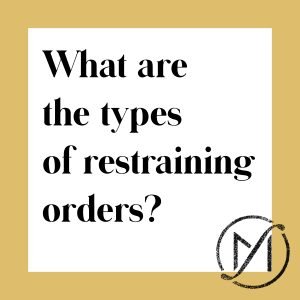What Are the Types of Restraining Orders?

There are three main types of restraining orders in Connecticut — also referred to as “protective orders.” They apply to different people and occur in different situations. The terminology overlaps and can be very confusing, so please read on to learn more and get clarity.
Three Types of Restraining Orders
There are three types of restraining orders or protective orders in Connecticut:
- Civil Restraining Orders (“Relief From Abuse”)
- Civil Protective Orders
- Criminal Protective Orders
Civil Restraining Orders (“Relief From Abuse”)
A Civil Restraining Order provides relief from physical abuse, stalking, or a pattern of threatening from a family or household member. A Civil Restraining Order takes place in a Connecticut Family Court, which is a civil court. This means that a judge can issue a Civil Restraining Order regardless of whether the accused person (“respondent”) was arrested.
Any family or household member subjected to a continuous threat of physical pain or physical injury, stalking, or a pattern of threatening may apply to the Superior Court for a restraining order. “Family or household members” are any of the following:
- Spouses or persons who have a civil union
- Former spouses or persons who a civil union
- People related by blood or marriage
- Those not related by blood or marriage living together as intimate partners (cohabitating)
- People not related by blood or marriage who formerly cohabitated as intimate partners
- Those who have a child in common, regardless of whether they have been married or cohabitated
- People who have (or recently had) a dating relationship
The Family Court is permitted to include certain financial support measures in its Civil Restraining Order when the petitioner and respondent are married or have dependent children in common.
How Long Do Civil Restraining Orders Last in Connecticut?
An order is effective for up to one year. The court may extend the length if the applicant files a motion for it to be extended.
What are the Penalties for Violating a Civil Restraining Order?
Criminal violation of a civil restraining order in Connecticut is a class D felony. A class D felony is currently punishable by up to five years in prison, a $5,000 fine, or both. The violation becomes a class C felony if the violation involves (1) imposing any restraint on the person or liberty of a person in violation of the order or (2) threatening, harassing, assaulting, molesting, sexually assaulting, or attacking a person in violation of the order. A class C felony is currently punishable imprisonment for 1 to 10 years, a fine up to $10,000, or both. Finally, it’s first-degree criminal trespass for a person, without permission or privilege to do so, to enter or remain in a building or any other premises in violation of a civil restraining order. (CGS § 53a–107). First-degree criminal trespass is a class A misdemeanor, punishable by imprisonment up to one year, a $2,000 fine, or both.
Civil Protective Orders
A Civil Protective Order provides protection to a victim of sexual abuse, sexual assault, or stalking not eligible for a Civil Restraining Order. A Civil Protective Order takes place in a Connecticut Superior Court, which, like the family court, is a civil court. As with Civil Restraining Orders, this means that judges can issue Civil Restraining Orders regardless of whether the respondent was arrested.
The key difference between a Civil Restraining Order and a Civil Protective Order — outside of what court you file in — is the relationship between the petitioner and respondent. The petitioner files a Civil Protective order when the respondent doesn’t fall into any of the Civil Restraining Order categories. Another key difference is the court may not issue financial support orders, as are sometimes possible with Civil Restraining Orders.
How Long Do Civil Protective Orders Last?
A Civil Protective Order must not exceed one year, unless the court extends it.
The court may extend the order if:
- The applicant filed a proper motion,
- A proper officer has served the respondent a copy of the motion,
- no other protection order based on the same facts and circumstances is in place, and
- the need for protection still exists.
What are the Penalties for Violating a Civil Protective Order?
As with a Civil Restraining Order, it is also a class D felony to violate a Civil Protective Order. Similarly, it is first-degree criminal trespass for a person, without permission or privilege to do so, to enter or remain in a building or any other premises in violation of a Civil Protection Order.
Criminal Protective Orders
Criminal Protective Orders are only available through the criminal courts when there is a criminal case. Generally, they last until the end of the criminal case.
Criminal Protective Orders are available in two circumstances: (1) if the individual is a victim of stalking, or (2) if the person was a victim of family abuse that led to the arrest of the abuser. The existence of a Criminal Protective Order does not prevent someone from seeking a Civil Restraining Order or a Civil Protective Order. In fact, in many situations, it makes sense to do so.
Learn the Next Steps to File a Restraining Order in Connecticut
If you want to learn more about the different types of protective and restraining orders, and the interplay between them, please reach out. Freed Marcroft’s first step, the Goals & Planning Conference is designed to get to the heart of your problem and unveil your true goals for your life. Once we discover your goals, we take all of our collective experience in the realm of divorce to build a customized strategy for you. Schedule your Goals & Planning Conference today, or contact us here.








